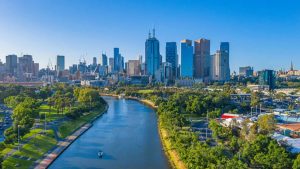
Job Opportunities In Mumbai In Next 5 Years: Transforming City With Environmental Education And Green Jobs
In the last 3 years, 47,000 new jobs were created in the renewable energy sector in India and the shift towards a green economy could add 3 million jobs by 2030.
Climate action objectives and circular economies go hand in hand, and they are leading the fastest growing markets for renewable energy and sustainable production but 55% of the population of India’s largest city, Mumbai, still live in slums. This fact often comes as a surprise as Mumbai – the capital of Maharashtra state and the financial capital of India – is also known as “the City of Dreams” as Mumbai’s business opportunities attract migrants from all over India.
Being an unplanned, rapidly urbanizing city, it faces many problems
URBANIZATION AND POVERTY
- Mumbai is the most populous city in India, at over 20 million people, and has one of the fastest rates of urbanization.
- Asia’s largest slum – Dharavi, which is home to more than a million people – lies right in the centre of the city.
WASTE AND SEWAGE MANAGEMENT
- Mumbai generates 7,000-7,500 tonnes of trash every day
- Around 80 to 110 tonnes of plastic waste – which is roughly the weight of 16 to 22 Asiatic elephants – is being dumped into Mumbai’s drains and water channels every day, and much of it is single-use plastic.
- 60% of the population is living in temporary establishments and shanties without access to proper sewage lines.
- Mumbai produces a staggering 2,371 million litres of sewage daily out of which only 2,016 million litres is redirected to Sewage Treatment Plants (STPs).
WATER POLLUTION
- Mithi River – the most polluted river in the state of Maharashtra – is more of a sewage line than a river as 100% of the water flowing through it was sewage dumped by the establishments set around it.
- The level of faecal coliform bacteria, which are found in human and animal excreta, was 180 times more than the standard level in the Mithi.
- The major lakes of Mumbai face a similar problem of trash and sewage being dumped in the water making it unfit for use.
- The coastal and estuarine regions of Mumbai are being polluted by sewage, dumping of trash and debris which is choking its biodiversity.
By 2050, Mumbai’s seas might have more plastic than fishes.
AIR POLLUTION
- Mumbai scores “moderate to unhealthy” on the air quality index.
- The city ranks 71st in the world and 27th in India in terms of Air pollution
- One of the worst years in recent past has been 2018, where the air quality was recorded to be 5 times worse than the limit prescribed by WHO.
- Due to its coastal location, the megacity benefits from the sea breeze, which helps to dispel some suspended pollutants.
FLOODING
- Between 2005 to 2015, Mumbai has incurred losses worth ₹140 million due to flooding.
- The deluge city experienced in 2005 that killed around 1,000 citizens
- A major reason for this annual monsoon trouble is inefficient drainage as the natural storm drainage system of the city – the Mithi river – is being choked and narrowed by the concrete boundaries.
HOW CAN ENVIRONMENTAL EDUCATION AND SUSTAINABILITY SAVE MUMBAI?
Environment and Sustainability do not only refer to environmental and ecological welfare. It refers to the balance between the Social, Environmental and Economical aspects of the city and is thus applicable in any and all sectors.
India has realized the need for environmental education and has not only made Environmental Education a compulsory subject in formal education but enacted laws like the ‘Companies Act’ to involve the companies and industries for their Corporate Social Responsibility (CSR).
India is first and the only country to have mandated CSR for a certain class of companies
Knowing this, it is crucial for businesses to know and understand the social and environmental factors of the CSR.
DEMAND FOR GREEN JOBS
Mumbai is seeing a shift in the economic trend as the businesses everywhere are gearing up for the new ventures offered in a more conscious, post-pandemic world.
India could create $218 billion in profits in next 10 years by adopting circular economy principles in the agriculture and vehicle manufacturing industries.
The focus is shifting towards a more green and sustainable future and with that, the demand for jobs and professionals working in environmental and sustainability sectors is also growing
- Corporate Social Responsibility professionals for companies and industries
- Consultants for industrial and government sectors
- Architects and Engineers for implementing Smart Cities ideas which are already in progress all over India
And so many more
ENVIRONMENTAL EDUCATION FOR PROFESSIONALS
Corporate Social Responsibility (CSR) is a management concept whereby companies integrate social and environmental concerns in their business operations as their responsibility towards customers and society.
The corporate involvement in environmental and sustainability practices is seen as a costly burden and ‘not-worth’ the efforts, but it can’t be more further from the truth as strategic CSR and sustainability practices within the business model help in,
- Reducing the business operating cost
- Improving brand value by creating positive environmental impacts.
Many leading brands and businesses are already shifting their actions in favour of society and the environment. For instance,
- In 2018, Mahindra Group – an Indian multinational conglomerate – joined hands with Mumbai Municipal Corporation to build awareness about the impact of plastic and to collect plastic waste
- For years, Reliance industries have played a proactive role towards empowerment and development in rural areas, healthcare, food and water security and conservation and promotion of biodiversity.
As the businesses realise and change their business model with the changing time towards a more sustainable future, the skill and employment requirements are bound to change.
COURSES TO UNDERSTAND SUSTAINABLE PRACTICES
Many institutes are offering an array of courses on environmental and sustainability topics. A better understanding of these topics is sure to help everyone from any sector. Some of these Certificate courses you might be interested in are,
- Strategies for sustainability program offered by Stanford
A self-paced online course, which explores frameworks and tools needed to promote sustainability. It is a 3-day course on how you can become a change agent through transformative leadership and design thinking. - Harvard sustainable business strategy course
The course explores the different business models that companies can use to drive change and explains why purpose-driven businesses are particularly well-positioned to tackle the world’s biggest problems including environmental problems and climate change - Circular economy – sustainable materials management by Lund University
This course looks at where important materials in products we use every day come from and how these materials can be used more efficiently, longer, and in closed loops. The course also teaches skills and tools for analyzing circular business models in the transition to a Circular Economy. - Certificate Course by Earth5R on Global Sustainability and Climate Change
Earth5R Institute of Social and Environmental Sustainability (EISES) offers certificate courses on Global Sustainability and Climate Change. The program blends online and offline learning (within 3 km of your location) with the ongoing projects. Students receive one-to-one learning and experience which offers great flexibility.
The course covers topics like Circular Economy, Social Entrepreneurship, Climate Change Mitigation Facilities and more.
ABOUT EARTH5R
Earth5R is an environmental organization from India with its head office at Mumbai. It works with the NGO sector, Companies and helps them conduct environmental corporate social responsibility (CSR) programs across India. Earth5R specializes in circular economy based projects. Earth5R also offers short term and long term environmental courses.
Earth5R’s Global Sustainability Hub is a cross-sector and cross-country collaboration in pursuit of UN Sustainable Development Goals. It is an excellent opportunity for governments and the private sector to engage with communities, use Sustainability-based models to drive economic changes and create social and environmental impact.
Reported by Riya Dani, Edited by Shafa Azzahra




